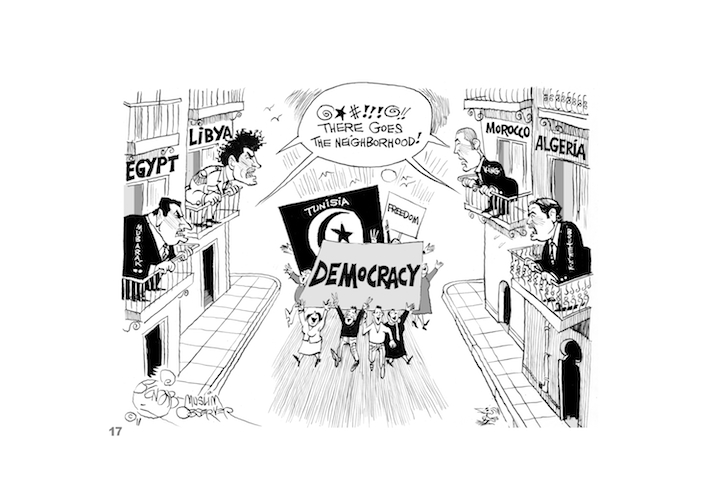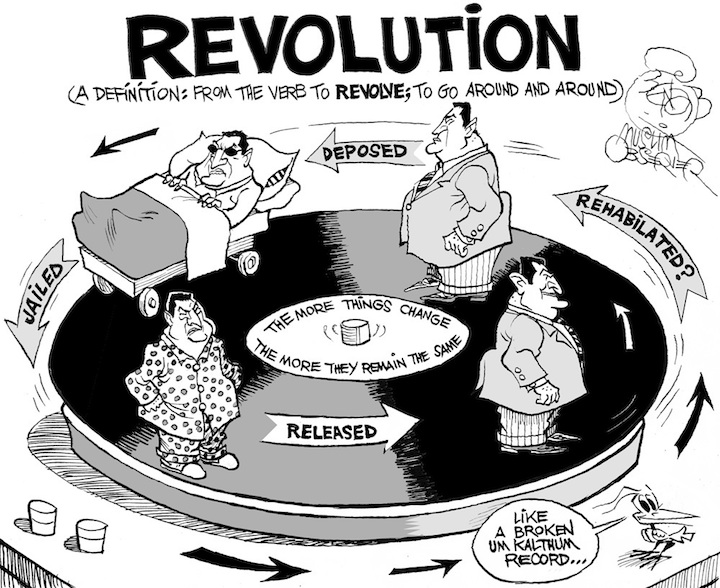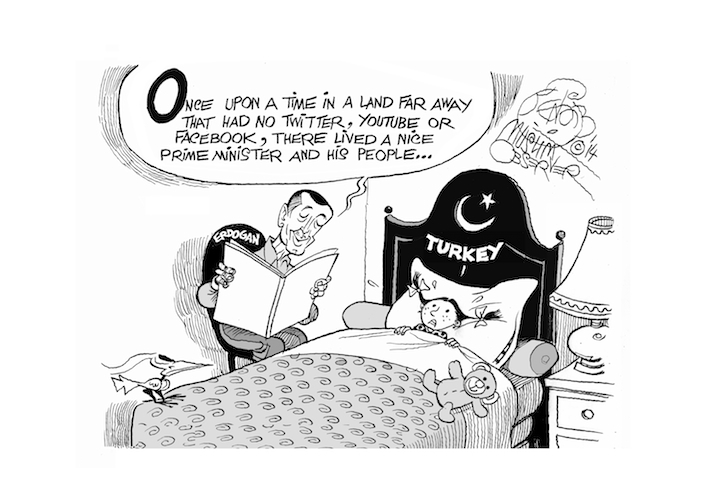Khalil Bendib, Too Big To Fail. Washington, DC: Tadween Books, 2015.
Jadaliyya (J): What was the idea behind putting together this collection of political cartoons?
Khalil Bendib (KB): It struck me at some point after the Arab Spring and the nuclear disaster in Fukushima—both following closely in the footsteps of the Wall Street meltdown—that epochal changes seemed to be finally happening all around us. The hubris of so many tyrannies, whether they be political, economic, or ecological, was starting to be challenged by large masses of people in so many different countries at the same time, and it occurred to me that the title Too Big to Fail would fit equally all these seemingly disparate juggernauts.
I must say I have really enjoyed drawing these cartoons. For the first time in my career, despite the various ups and downs that can be expected in revolutionary times, hope finally seemed to be pointing its nose at the end of the tunnel (to mix metaphors like a pro.)
J: How does the link between humor and politics inform your work?
KB: Humor is often born out of pain, misery, or anger. All these things happening around us that make us feel sometimes powerless are at the same time perfect fodder for sarcasm and ridicule. Humor for people like me functions as a way to maintain our sanity. It also serves to sweeten the bitter pill of truth that I try to administer to readers who are sometimes reluctant to be challenged in their political beliefs. First you read, then you catch yourself wondering why this is funny, and then realize that the joke actually makes a good point that you may not have thought of. Humor is there to disarm and deconstruct conventional wisdom and preconceived ideas.
J: How does this work connect to and/or depart from your previous work?
KB: I have had previous collections of my editorial cartoons, but this is probably the most hopeful and therefore the most fun; it doesn’t just criticize and denounce, it also celebrates and foretells of better days to come.
J: Who do you hope will read this book, and what sort of impact would you like it to have?
KB: I hope all those who were doubtful about the possibility of a more just and sustainable world will read it and find encouragement and motivation within its pages. I’m an idealist and an optimist: all my political work is aimed at helping usher in a better world. I believe that political cartooning should be almost a form of activism, not just idle commentary for the sake of commentary.
J: What is your process for illustrating a new cartoon—do you start with an image, an issue, or a joke first?
KB: I never start from a drawing, as some people imagine. I always start from a precise idea that I mull and perfect until the cartoon is ready to be drawn. This is not conceptual or performance art. There is little room for improvisation, and every barb is premeditated. You decide what topic you’ll tackle, zero in on the absurdity contained within, find a gag, a symbol, or a pun to encapsulate it and then—and only then—draw to the best of your ability.
J: What other projects are you working on now?
KB: I’m working on three different graphic novels: one on Snowden, Assange, and other important whistleblowers titled Verax, as well as a continuation of my best-selling book Zahra’s Paradise, on the 2009 “Green Revolution” in Iran, which is now published in sixteen languages. Plus, I am working on an adaptation of a novel by Luis Sepulveda on the 1973 Chilean coup, called The Shadow of What We Were. The common denominator to these three projects is the theme of popular resistance against tyranny.
Excerpts from Too Big to Fail



[Excerpted from Too Big to Fail, by Khalil Bendib, by permission of the author. © 2015 Tadween Publishing. For more information, or to purchase this book, click here.]